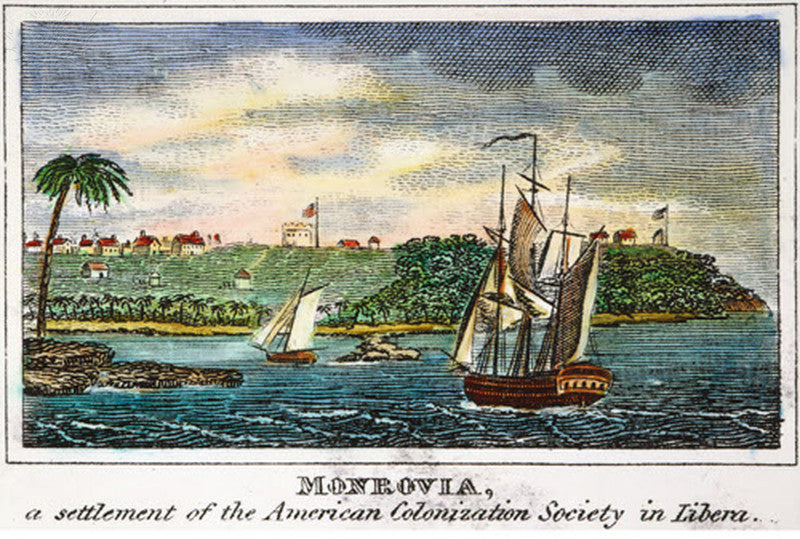
American Colonization Society & Samuel Wilkeson
Judge Samuel Wilkeson, 1781-1848 (alt. 1843)
General Agent for the American Colonization Society, 1838

Judge Samuel Wilkeson was a shipbuilder during the War of 1812, a New York Judge, New York State Assemblyman, Senator and Mayor of Buffalo prior to his work with the ACS.
Recent scholarship argues that Abraham Lincoln relied on reports from Judge Wilkeson's son, Samuel, Jr. (1817–1889) for the writing of the Gettysburg Address. Samuel, Jr. worked for the New York Tribune under Horace Greeley and was a correspondent with Army of the Potomac during the Civil War. Samuel Wilkeson, Jr. was married to Catherine Henry Cady, sister of Women's suffragist and abolitionist Elizabeth Cady Stanton.
https://housedivided.dickinson.edu/sites/blogdivided/2013/07/07/new-details-about-first-draft-of-gettysburg-address/
https://www.washingtonpost.com/outlook/2021/11/18/lincoln-gettysburg-samuel-wilkeson/
American Colonization Society 1816-1964
The motives behind the creation of the American Colonization Society (ACS) were extraordinarily divergent and they remain an extremely contentious area of study. The formation of the ACS stands notable as an early flashpoint in the beginning of the antebellum era.

The ACS was founded on December 21, 1816 in a meeting that brought together many conflicting perspectives and motives. Its primary organizers were Connecticut preacher and missionary Samuel John Mills, New Jersey Presbyterian minister Dr. Robert Finley and Virginia Congressman Charles F. Mercer. This founding meeting also was attended by Henry Clay, Daniel Webster and John Randolph. The objective of the ACS was to finance the emigration of free American blacks to a free colony in West Africa. That colony would later be called Liberia, or the “Land of Freedom.”
The first president of the ACS was Bushrod Washington (1762-1829), the nephew of U.S. President George Washington and an Associate Justice of the Supreme Court of the United States.
Abolitionist William Lloyd Garrison initially was warm to the idea of the ACS but he soon became known as one of its fiercest and most vocal opponents.

In 1832 Garrison wrote an extended attack on the American Colonization Society in the pamphlet shown above, entitled Thoughts on African colonization, or, An impartial exhibition of the doctrines, principles and purposes of the American Colonization Society : together with the resolutions, addresses and remonstrances of the free people of color.
Black support of the ACS also was very mixed, as illustrated by the split between the two editors of the first black-owned and edited newspaper in the United States (Freedom’s Journal, New York City, 1829-1830). Editor Samuel Cornish published articles that opposed this colonization movement. Editor John Brown Russwurn worked closely with the ACS and would later move to Liberia and be elected Governor of “Maryland in Africa.”

By the time of the American Civil War, more than 15,000 freed and free-born American black people, and 3,198 Afro-Caribbeans, relocated to the colony. The Republic of Liberia declared its independence on July 26, 1847. The ACS, as well as several northern state governments and local colonization chapters, continued to provide money and emigrants as late as the 1870s.
The U.S. recognized Liberia's independence during the Civil War on February 5, 1862, which was made possible by the secession of the Confederate States.
ACS activity largely halted during the Civil War as black Americans gained their freedom and saw little reason to emigrate.
The ACS became active again following the Civil War after many now free black Americans were disillusioned by the policies and political environment of the Reconstruction era. At least another 2,000 emigrants traveled to Liberia in the 1870s. The last ACS funded emigrants arrived in Liberia in 1904. From 1904 to its dissolution in 1964, the American Colonization Society shifted its work to providing financial aid to the country of Liberia.

Kentucky-in-Africa
Kentucky in Africa was a ACS colony founded in 1828 in what is present-day Montserrado County, Liberia. A Kentucky state affiliate of the American Colonization Society, members raised money to transport black people from Kentucky, freeborn volunteers as well as slaves set free on the stipulation that they leave the United States, to Africa. The Kentucky society bought a 40-square-mile site along the Saint Paul River (close to the site of the present-day capital city of Monrovia) and named it Kentucky in Africa. Kentucky in Africa was annexed by Liberia in about 1847.
Maryland-in-Africa and the Republic of Maryland was settled in 1834 and funded by Massachusetts’ State Colonization Society. The Maryland colony remained separate from the Commonwealth of Liberia, as the colonization society wished to maintain its trade monopoly in the area. On February 2, 1841, Maryland-in-Africa became the Independent State of Maryland. The Republic of Maryland was united into the Commonwealth of Liberia, when it declared its independence from the American Colonization Society on July 26, 1847. Following an independence referendum in 1853, the state declared its independence on May 29, 1854, under the name Maryland in Liberia, with its capital at Harper. The4 Republic of Maryland was annexed by Liberia in 1857.
Mississippi-in-Africa
Mississippi-in-Africa was a colony on the Pepper Coast of West Africa founded in the 1830s by the Mississippi Colonization Society of the United States and settled by American free people of color, many of them former slaves. Mississippi-in-Africa was annexed by Liberia in 1842. Mississippi-in-Africa was located in what is present-day Sinoe County, Liberia.

The African Intelligencer, published by the ACS, Vol 1, Issue 1 (Library of Congress)